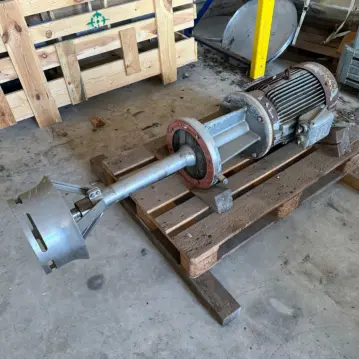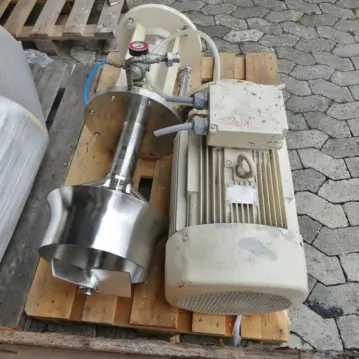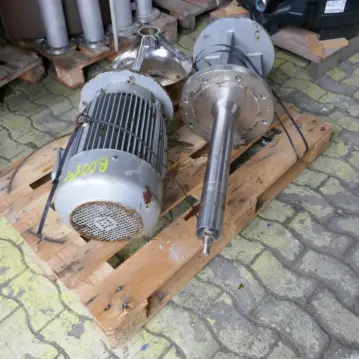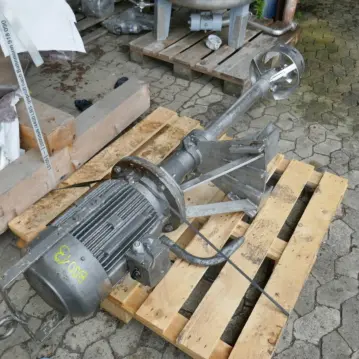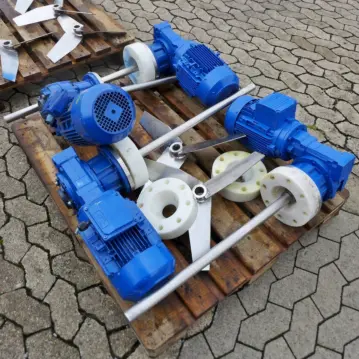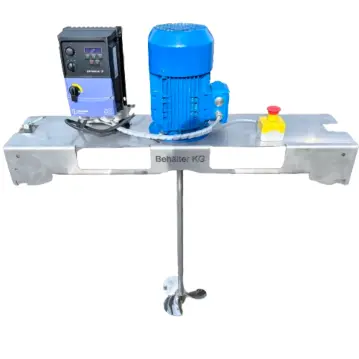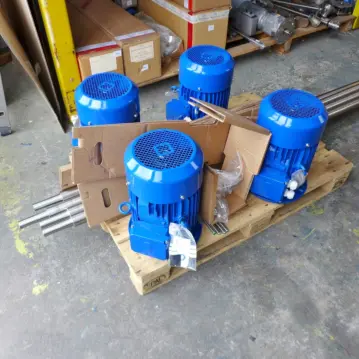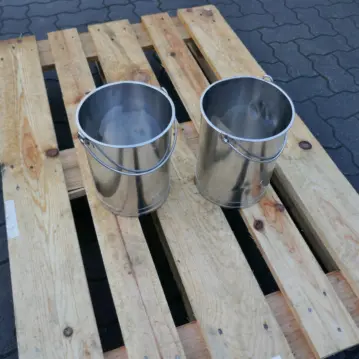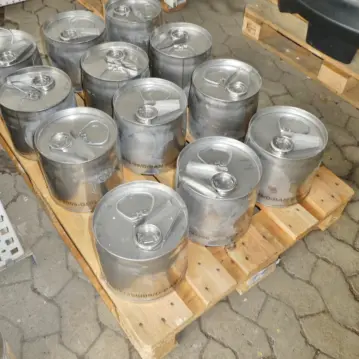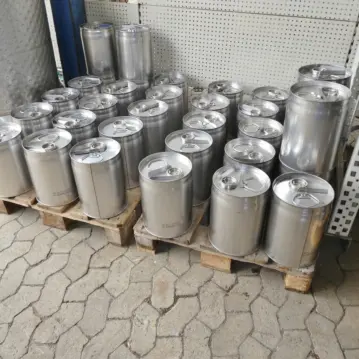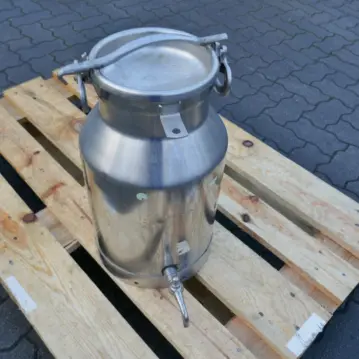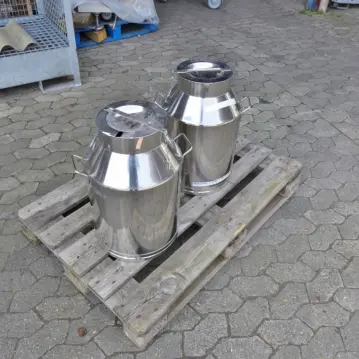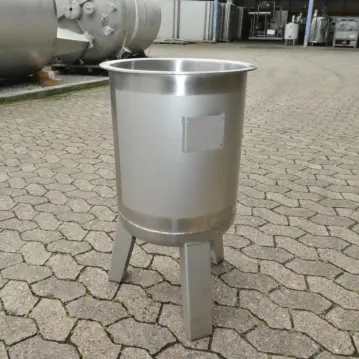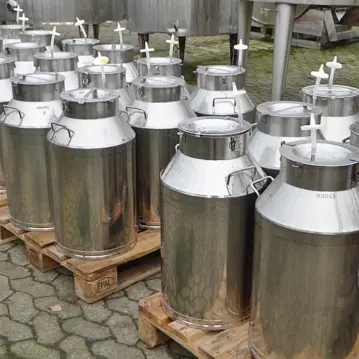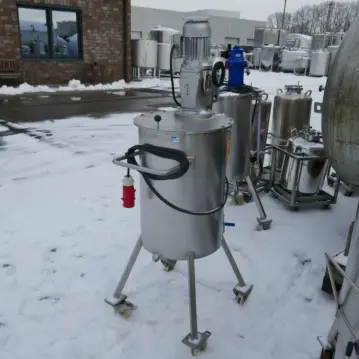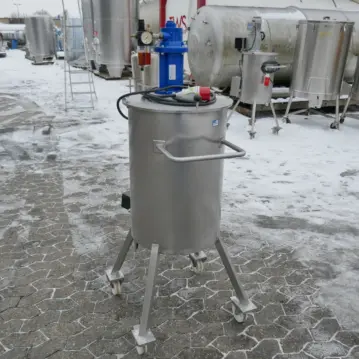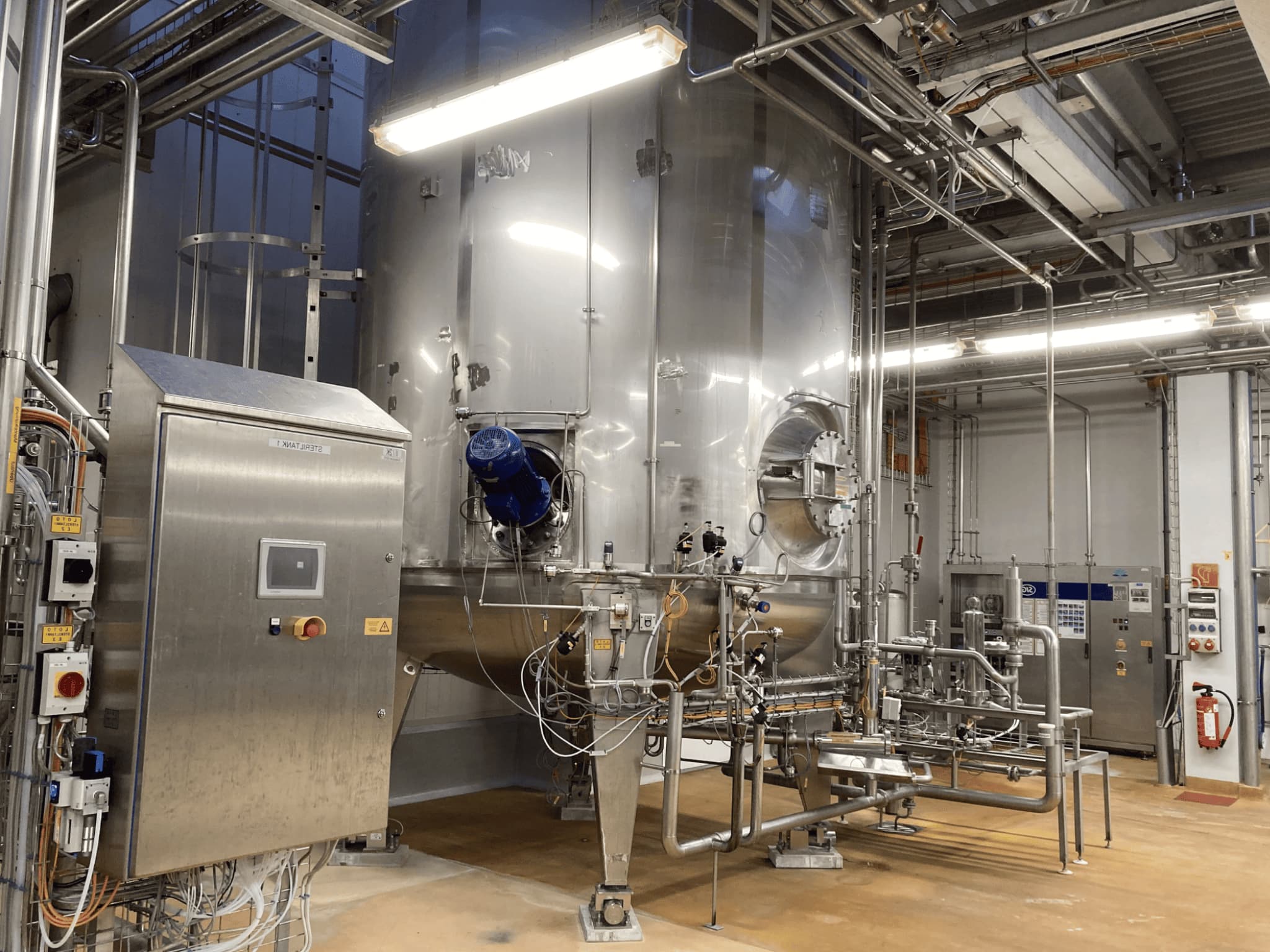Tanks & Agitators Made of Stainless Steel AISI 304 – Available from Stock
The material AISI 304, also known as 1.4301 (V2A), is the most commonly used stainless steel alloy in industrial tank and vessel construction. At Behälter KG, we offer one of Europes largest inventory of new and used stainless steel tanks, containers and agitators made of AISI 304. All products are available from stock in Germany and can be shipped worldwide. read more...
Products
- agitator: jet stream mixer
- power: 11 / 16 KW
- output speed: 720 / 1455 rpm
Price per piece, excl. VAT
1 on Stock
- agitator: jet stream mixer
- power: 13 / 19 KW
- output speed: 730 / 1455 rpm
Price per piece, excl. VAT
3 pieces on stock
- agitator: jet stream mixer
- power: 3.5 / 13 KW
- output speed: 730 / 1475 rpm
- shaft length: 600 mm
- shaft diameter: 75 mm
Price per piece, excl. VAT
1 on Stock
- agitator: jet stream mixer
- power: 7 / 10.5 KW
- output speed: 725 / 1448 rpm
- shaft length: 940 mm
- shaft diameter: 75 mm
Price per piece, excl. VAT
1 on Stock
- agitator: cross blade stirrer
- power: 2.2 KW
- output speed: 205 rpm
- shaft length: 680 mm
- shaft diameter: 35 mm
- blade diameter: 540 mm
Price per piece, excl. VAT
1 on Stock
2,490.00 €
- agitator: propeller
- power: 1.5 KW
- output speed: 0 - 1450 rpm
- shaft length: 800 mm
- shaft diameter: 24 mm
- blade diameter: 140 mm
Price per piece, excl. VAT
5 pieces on stock
- agitator: propeller
- power: 3.0 KW
- output speed: 710 rpm
- shaft length: 2.350 mm
- shaft diameter: 50 mm
- blade diameter: 250 mm
Price per piece, excl. VAT
1 on Stock
- total height: 240 mm
- cylindrical height: 220 mm
- diameter inside: 170 mm
Price per piece, excl. VAT
2 pieces on stock
- total height: 210 mm
- diameter inside: 230 mm
Price per piece, excl. VAT
1 on Stock
- total height: 310 mm
- diameter inside: 230 mm
Price per piece, excl. VAT
25 pieces on stock
- total height: 550 mm
- diameter inside: 270 mm
Price per piece, excl. VAT
1 on Stock
- total height: 560 mm
- cylindrical height: 360 mm
- diameter inside: 350 mm
Price per piece, excl. VAT
2 pieces on stock
- documents available:
- total height: 800 mm
- cylindrical height: 450 mm
- diameter inside: 400 mm
Price per piece, excl. VAT
Request
- total height: 820 mm
- cylindrical height: 470 mm
- diameter inside: 350 mm
Price per piece, excl. VAT
2 pieces on stock
2,450.00 €
- double jacket
- agitator: propeller
- output speed: 77 - 540 rpm
- power: 0.55 KW
- EX-proof:
- total height: 1.700 mm
- cylindrical height: 520 mm
- diameter inside: 390 mm
- diameter outside: 460 mm
Price per piece, excl. VAT
1 on Stock
2,450.00 €
- double jacket
- agitator: propeller
- total height: 1.520 mm
- cylindrical height: 520 mm
- diameter inside: 390 mm
- diameter outside: 460 mm
Price per piece, excl. VAT
1 on Stock
Stainless Steel 304 – The Most Common Material in Stainless Steel Tank Construction
Stainless steel AISI 304 is one of the most widely used alloys in the field of stainless steels. Colloquially, it is also referred to as 1.4301 or V2A, in the German-speaking region. With its excellent mechanical and chemical properties, this material has established itself in numerous industries. Especially in the production of stainless steel tanks, which are used in various sectors such as the food industry, chemical industry, or pharmaceutical industy, 304 offers excellent properties.
In this article, we would like to highlight the key properties of stainless steel 304, show its versatile applications, and explain why this material is the ideal choice for stainless steel vessels in various industries. Also, take a look at our article on The Durability of Stainless Steel and our Overview of Common Materials for Stainless Steel Tanks
What is Stainless Steel 304
Stainless steel AISI 304 belongs to the group of austenitic stainless steel alloys. This alloy consists mainly of iron, chromium (18–20%), nickel (8–10.5%), and contains small amounts of manganese, silicon, and carbon. The high nickel content gives 304 its special toughness and corrosion resistance, while the chromium content enables the formation of a passive oxide layer on the surface, which protects against further corrosion processes.
Key Features:
- Corrosion Resistance: Stainless steel 304 shows excellent resistance to many types of corrosion, particularly in atmospheric environments, during the storage and processing of food, and in many other industrial applications.
- Austenitic Structure: The austenitic structure of 304 gives this material high toughness and formability. The alloy is also non-magnetic, making it ideal for many applications in electrical engineering and electronics.
- Weldability: Stainless steel 304 is excellent for welding without the risk of cracking or significant reduction of mechanical properties at the weld joints. This makes it ideal for the production of stainless steel processing vessels and other complex constructions.
- Hygienic Properties: The smooth, pore-free surface of 304 prevents dirt and microorganisms from adhering and is easy to clean. This feature is particularly important for use in the food industry (e.g., for milk, beverages, or fruit preparations).
Representation of aseptic sterilization tanks made of AISI 304 in a large dairy
Differences from Other Stainless Steel Alloys
Stainless steel 304 differs from other stainless steel types, particularly high-alloyed alloys such as AISI 316 or 316L, mainly due to the lower molybdenum content and somewhat lower corrosion resistance in extremely aggressive environments. However, 304 offers excellent performance for many applications and is a preferred choice in many industries. Another distinguishing feature from other alloys is the lower nickel content, which makes stainless steel 304 a more cost-effective option for applications with lower requirements for corrosion resistance and mechanical stress.
Buy Used Tanks & Process Equipment in AISI 304
At Behälter KG Bremen, we offer well over 1000 used tanks, agitators and reactors made of AISI 304 from stock. All used 304 storage tanks and agitators are immediately available from our warehouse in Germany and can be purchased significantly cheaper than a newly build product. This greatly reduces investment risks without compromising on the quality of the particular piece of process equipment. Moreover, by purchasing a used 304 agitator or vessel, you contribute to the circular economy, as no new resources are required for production of the already existing item.
For almost all tanks & vessels made of AISI 304, we provide extensive technical documentation and information on the exact last application, so that the suitability for a new project can be quickly assessed. You can also inspect all 304 stainless steel tanks and all other available pieces of process equipment at our central warehouse in Bremen (Northern Germany).
Essential Properties of Stainless Steel 304
Stainless steel AISI 304 is characterized by a variety of excellent mechanical and chemical properties, which make it one of the most popular materials in the field of stainless steel pressure tanks and many other industries:
1. Corrosion Resistance
Due to the high chromium content (18–20%), stainless steel 304 offers very good resistance to corrosion in many environments. Particularly advantageous is its resistance to:
- Atmospheric Corrosion: Stainless steel 304 is particularly suitable for use in humid and moist environments, as it is capable of forming a protective oxide layer that shields the material from further corrosion attacks.
- Dilute Acids: The alloy offers good resistance to many mild acids, such as those found in food processing or the pharmaceutical industry.
- Saltwater and Chlorides: Stainless steel 304 is resistant to salty environments, making it a preferred choice for applications in the maritime sector and the food industry.
2. Strength and Toughness
Stainless steel 304 (1.4301) is known for its high toughness and strength, which does not decrease at low temperatures. This enables its use in numerous industrial applications where mechanical loads occur (this also includes the use of agitators).
3. Heat Resistance
Stainless steel AISI 304 is well-suited for use at typical operating temperatures in the food or pharmaceutical industries (e.g., 0 - 150 degrees Celsius). The widely used Cleaning in Place (CIP) or Sterilization in Place (SIP) processes, i.e., steam or hot water sterilization at 120 to 130 degrees Celsius, are not critical for the material 304. Even for higher temperatures, stainless steel 304 is generally suitable, but its corrosion resistance decreases at significantly higher temperatures. For applications in hot environments, stainless steel AISI 304 offers good thermal stability and is therefore widely used in many industries, such as food processing or mechanical engineering.
4. Weldability and Formability
A standout feature of stainless steel 304 is its excellent weldability. The material can be processed effortlessly with all common welding methods such as MIG, TIG, or arc welding without causing distortion or cracking. It is also highly formable and can be shaped into the desired form with little effort, making it particularly suitable for the production of stainless steel tankd and process equipment.
5. Hygiene and Purity
The pore-free and smooth surface of stainless steel 304 ensures a hygienic and easy-to-clean surface. This feature is particularly important in the food industry and medical technology, as bacteria, germs, and microorganisms cannot accumulate easily. Stainless steel tanks made of 304 are therefore ideal for applications where hygiene and purity are of the utmost importance.
Application Areas of Stainless Steel 304
Stainless steel AISI 304 is used in many industries. The following applications are particularly noteworthy:
1. Food Industry
In the food industry, stainless steel 304 is highly sought after due to its good corrosion resistance and hygienic properties. Stainless steel vessels made of 304 are used in food processing, for food storage, in refrigeration systems, and in beverage production. Stainless steel 304 is also frequently used in the production of machinery for the food industry.
2. Chemical Industry
The chemical industry requires materials that can resist a variety of chemicals. Stainless steel 304 is capable of withstanding many chemical substances and is therefore frequently used for piping, tanks, and other equipment in chemical production. Particularly for applications that do not involve extreme corrosion conditions, 304 is a cost-effective and reliable choice.
3. Mechanical Engineering and Automotive Industry
In mechanical engineering and the automotive industry, stainless steel 304 is frequently used. It is mainly used for machine components, containers, housings, pipes, and latches. The combination of strength, toughness, and formability makes it ideal for these industries, where high mechanical loads occur.
